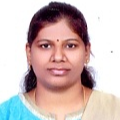
P. Sujatha
Work place: Vels University, Department of computer science, Chennai, 600117, India
E-mail: suja.research@gmail.com
Website:
Research Interests: Network Architecture, Network Security, Image Processing, Data Mining, Data Structures and Algorithms
Biography
Dr. P. Sujatha is working as Head and Associate Professor in the Department of Computer Science, School of Computing Sciences, Vels University, Chennai, Tamil Nadu, India which is well known University. She has 17 years of teaching experience in both UG and PG Level. She has received her M.Sc (Computer Science) degree from Madurai Kamaraj University, M.Phil degree from Periyar University, Tamil Nadu, India and Ph.D degree in Computer Science from Vels University, Chennai, Tamil Nadu, India. Her research interests include Image Processing, Network Security and Data Mining. She has produced 6 M.Phil Scholars. Currently she is guiding 8 Ph.D., Research Scholars and 3 M.Phil Research Scholars in Vels University.
Author Articles
Fuzzy Based Multi-Fever Symptom Classifier Diagnosis Model
By Ighoyota Ben Ajenaghughrure P. Sujatha Maureen I. Akazue
DOI: https://doi.org/10.5815/ijitcs.2017.10.02, Pub. Date: 8 Oct. 2017
Fever has different causes and types, but with similar symptoms. Therefore, making fever diagnosis with human physiological symptoms more complicated. This research project delves into the design of a web based expert multi-fever diagnosis system using a novel fuzzy symptom classifier with human self-observed physiological symptoms. Considering malaria, Lassa, dengue, typhoid and yellow fever. The fuzzy-symptom classifier has two stages. Fist stage is fever type confirmation using common fever symptoms, leading to five major fuzzy rules and the second phase is determining the level of infection (severe or mild) of the confirmed type of fever using unique fever symptoms. Furthermore, Case studies during the system implementation yielded data collected from 50 patients of having different types of fever. The analysis clearly shows the effectiveness and accuracy in the system performance through false result elimination. In addition, acceptability of the system was investigated through structured questionnaire administered to same 50 patients. This result clearly indicates that the system is well accepted, by users and considered fairly easy to use, time and cost saving.
[...] Read more.Other Articles
Subscribe to receive issue release notifications and newsletters from MECS Press journals